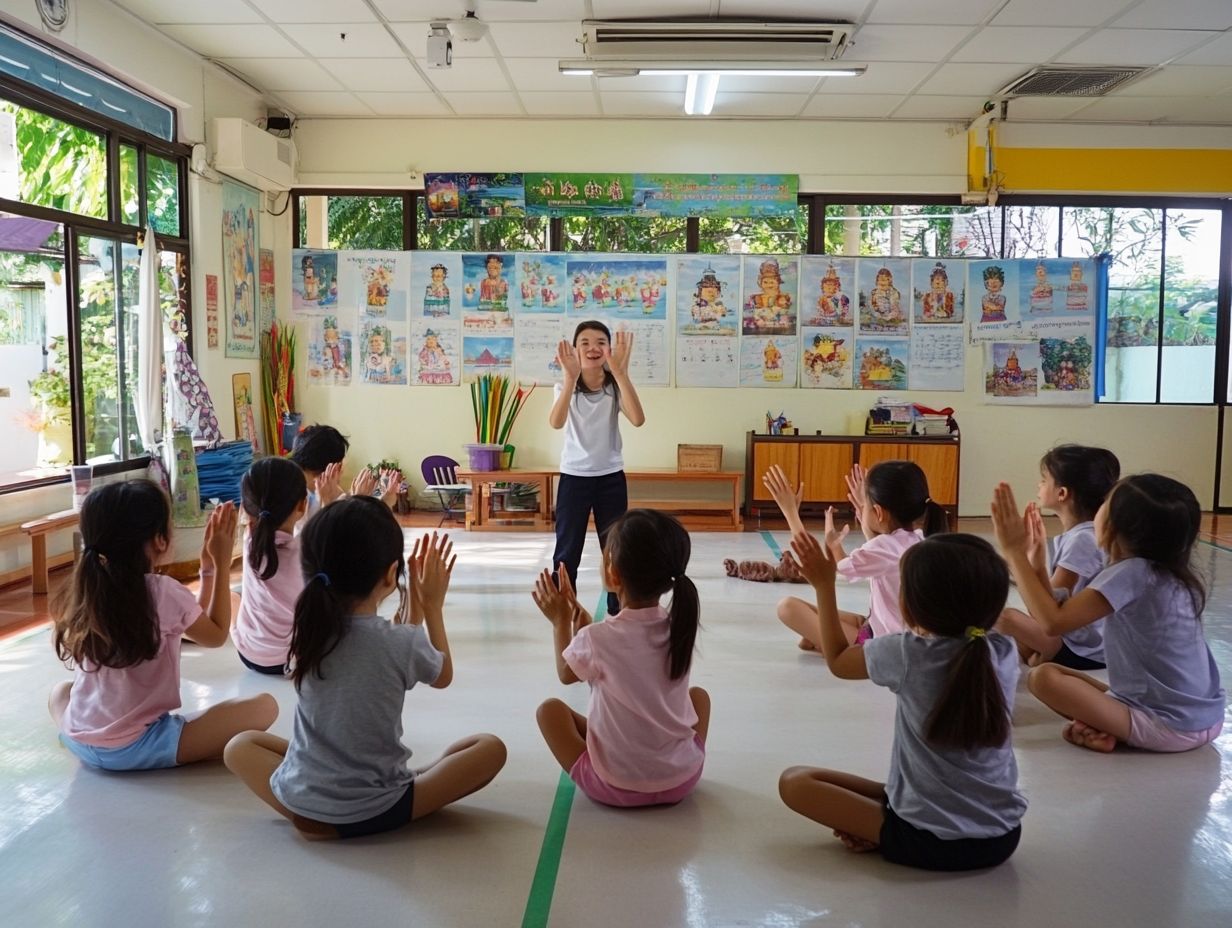Cultural Etiquette for Students in Thailand
Thailand, often hailed as the “Land of Smiles,” is a country brimming with vibrant cultural traditions and values.
For anyone looking to connect with the locals especially students studying or visiting understanding Thai culture is absolutely essential. This article delves into the core values and beliefs that shape Thai society, providing you with valuable guidance on proper etiquette for greetings and communication.
Get ready to explore exciting customs, from appropriate attire to dining etiquette and gift-giving practices. Discover what it takes to navigate social interactions in Thailand with respect and genuine meaning.
Contents
- Key Takeaways:
- Understanding Thai Culture
- Etiquette for Greetings and Communication
- Respecting Thai Customs and Traditions
- Dress Code and Appearance
- Dining Etiquette in Thailand
- Gift Giving and Receiving
- Frequently Asked Questions
- What etiquette tips should students follow in Thailand?
- What is the proper way to greet someone in Thailand?
- Is it considered rude to refuse food in Thailand?
- Are there any specific dress codes to follow in Thailand?
- What is the importance of showing respect towards the Thai monarchy?
- Is it appropriate for students to haggle or bargain in Thailand?
Key Takeaways:

- Learn key values to navigate Thai culture successfully.
- Use the right greetings and gestures for effective communication.
- Familiarize yourself with customs around dress, dining, and gifting to build strong relationships.
Understanding Thai Culture
Understanding Thai culture is vital for anyone planning a visit to Thailand. It weaves a rich tapestry of traditions, values, and beliefs that shape daily life in this vibrant Southeast Asian nation.
You can see this respect in many parts of Thai culture. From the renowned warmth of Thai hospitality to the complex customs that influence social interactions, immersing yourself in these cultural nuances will enrich your travel experience and encourage respectful behavior towards the locals.
Greg Rodgers emphasizes the significance of grasping these elements, enabling you to navigate Thailand s unique societal norms and historical context with ease and grace.
Key Values and Beliefs
Key values and beliefs in Thailand center around respect, family, and spirituality, deeply influenced by Buddhism and its teachings, which weave through daily life and interactions across the country.
This profound reverence is evident in various aspects of Thai culture, where the royal family is held in high regard, their image serving as a symbol of national pride and unity. Monks, regarded as spiritual guides, are similarly respected, with the community often participating in almsgiving as a means to cultivate merit.
The hierarchical structure within families and society emphasizes honoring elders, reinforcing the significance of lineage and ancestral wisdom. These foundational values shape individual behaviors and highlight social interactions, fostering a cohesive society grounded in mutual respect and spiritual fulfillment.
Etiquette for Greetings and Communication
In Thailand, the etiquette surrounding greetings and communication is intricately woven into the fabric of cultural traditions. The wai gesture, a traditional way of greeting with hands pressed together, exemplifies respect and humility, setting a harmonious tone for social interactions.
Understanding these customs helps you navigate daily life with grace and cultivate meaningful relationships with the locals.
Traditional Forms of Greeting
In Thailand, the traditional greeting known as the wai gesture holds significant meaning, serving as a respectful form of communication in various social contexts, from casual encounters to formal settings.
This unique gesture involves pressing your palms together in a prayer-like manner while bowing slightly, truly embodying the essence of Thai politeness. The height at which you hold your hands can vary, symbolizing different levels of respect; for example, raising your hands to your forehead signals a greeting for someone revered.
Understanding when to use the wai is crucial it s often exchanged during greetings, farewells, and expressions of gratitude or apology. Keep in mind that not everyone, especially foreigners, is expected to perform this gesture, as cultural nuances and familiarity play a vital role in its acceptance within the rich tapestry of Thai customs.
Appropriate Language and Gestures

In Thailand, using appropriate language and gestures is very important. Here, politeness and emotional control are not just appreciated; they are truly revered in all interactions.
This cultural aspect shapes everything from casual conversations to business dealings. For anyone eager to navigate the social or professional landscapes in the country, understanding these ways of talking is essential.
The Thai approach to conversation often leans toward the indirect; subtlety and nuance carry significant weight. Abruptness may be perceived as disrespectful.
Emotional control takes center stage. Maintaining composure is often viewed as a hallmark of good manners.
A relaxed demeanor paired with positive body language can elevate your interactions. Remember, gestures can be as meaningful as words.
By mastering these fundamentals, you can cultivate stronger relationships and foster mutual respect. This is vital for both personal and professional connections.
Respecting Thai Customs and Traditions
Respecting Thai customs and traditions is essential for anyone visiting Thailand. These elements are intricately woven into the fabric of the country’s cultural etiquette.
Knowing these customs can elevate your experience in Thailand! By understanding Buddhist practices and showing proper respect during ceremonies, you enhance your personal experiences.
Adhering to the unwritten social rules also cultivates goodwill among the locals. Embracing these traditions opens doors to deeper connections and a richer appreciation of the vibrant Thai culture.
Important Customs to be Aware of
Important customs in Thailand include fundamental practices you’ll want to embrace. For example, removing your shoes before stepping into homes or temples is common.
Dressing modestly is also important, as well as showing respect for monks, who are held in high regard in Thai society.
As you explore the temples, be mindful to avoid pointing your feet at holy images. This gesture is considered disrespectful since feet are viewed as the lowest part of the body.
A polite greeting you might use is the ‘wai’ a slight bow with your hands pressed together in a prayer-like gesture. This is appropriate in various social contexts.
You ll notice that pagodas and sacred sites often showcase intricate statues. Remember that touching or climbing on them is frowned upon.
By understanding these cultural nuances, you enhance your travel experience and demonstrate genuine respect for the rich traditions and beliefs that permeate everyday life in Thailand.
Dress Code and Appearance
The dress code in Thailand embodies the rich cultural values of the nation. It places a strong emphasis on modest attire and a polished appearance.
This is particularly important during social interactions and when visiting sacred sites like temples. Adhering to these guidelines is crucial for fostering respect.
It also helps you navigate your experience with grace and mindfulness.
Appropriate Attire for Different Situations
Appropriate attire for various situations in Thailand varies greatly. It s essential to choose wisely.
When visiting temples, don modest clothing; in corporate settings, your attire should radiate professionalism.
For casual outings, opt for comfortable yet polished clothing that resonates with the local culture. Light fabrics are a smart choice, especially given the warm climate.
In business environments, think tailored suits or formal blouses. Be sure to avoid overly casual options to uphold business etiquette.
When entering places of worship, like Buddhist temples, it s essential to wear modest attire that covers your shoulders and knees. Don t forget to remove your shoes.
This practice showcases your respect and reverence for these sacred spaces. Understanding the nuances of appropriate dressing enhances your experience and fosters better cultural integration and mutual respect.
Dining Etiquette in Thailand

Dining etiquette in Thailand showcases its vibrant culinary traditions. Proper table manners, communal dining, and hospitality are all vital to this rich culture.
Familiarizing yourself with dining practices elevates your meal experience. It also shows respect for the cultural nuances that enrich dining in Thailand.
Proper Table Manners and Dining Customs
Proper table manners and dining customs in Thailand embrace the beauty of communal dining. Meals are shared among family and friends, creating a warm atmosphere of togetherness and hospitality.
This distinctive approach strengthens social bonds and highlights the rich cultural heritage woven into Thai cuisine. Guests are often encouraged to sample a little bit of everything, a gesture that shows respect for the cook s efforts and the delightful array of flavors on offer.
Traditional customs stipulate that meals commence only after the eldest member begins. This practice reflects respect for hierarchy and tradition.
In terms of utensils, using forks and spoons with the spoon held in the right hand underscores the importance of maintaining cleanliness and propriety at the table. Grasping these nuances can elevate your dining experience in Thailand, making it not just a meal but a delightful cultural journey.
Gift Giving and Receiving
Gift giving and receiving in Thailand is an art form steeped in cultural etiquette. Knowing the nuances of when and how to present gifts is crucial for building good relationships and respect in your social interactions.
Engaging thoughtfully in this practice enhances connections and honors the rich traditions that define Thai society.
When and How to Give Gifts
In Thailand, understanding the nuances of gift-giving is essential. It demonstrates your grasp of social interactions and cultural etiquette, ultimately nurturing positive relationships.
Timing is everything. It s courteous to present gifts during significant celebrations like Songkran or Loy Krathong, ensuring your gesture aligns with the festive atmosphere.
The way you present your gift matters too. Beautifully wrapped items that reflect your thoughtfulness are highly valued and show respect.
Remember, gifts symbolize goodwill, connection, and mutual respect. The act of giving, when paired with polite manners and genuine intentions, strengthens the bond between you and the recipient, making it a treasured aspect of Thai culture.
Acceptable Gifts in Thai Culture
Acceptable gifts in Thai culture are thoughtful and practical items that resonate with traditional values. They highlight the significance of consideration and respect in the art of gift-giving.
Get ready! Understanding Thai gift-giving can truly boost your relationships. For instance, presenting items such as fresh fruit, desserts, or floral arrangements is typically well-received, allowing the recipient to indulge in something delightful and imbued with goodwill.
It’s equally important to steer clear of bright colors like black or white for gift wrapping, as these hues are often linked to funerals. Opting for softer colors reflects joy and harmony, aligning with cultural expectations.
The way you present the gift also matters greatly. Adopting a humble demeanor and respectful approach will convey your sincerity and appreciation to the recipient.
Frequently Asked Questions

What etiquette tips should students follow in Thailand?
Some important tips include addressing elders with respect, not touching someone’s head, and removing shoes before entering a home or temple.
What is the proper way to greet someone in Thailand?
The most common way to greet someone is by placing your palms together in a prayer-like gesture and bowing slightly, known as the “wai”.
Is it considered rude to refuse food in Thailand?
Yes, it is seen as rude to refuse food when offered. Try at least a small amount to show your appreciation.
Are there any specific dress codes to follow in Thailand?
Dress modestly in public places and temples. This means covering your shoulders and knees and avoiding revealing clothing.
What is the importance of showing respect towards the Thai monarchy?
The Thai monarchy is highly respected. Avoid speaking negatively about the royal family.
Is it appropriate for students to haggle or bargain in Thailand?
Haggling is common, but do it respectfully with a smile! It s best to haggle at markets or street vendors, not in larger stores.
In summary: Always show appreciation for food offered to you, dress modestly, respect the monarchy, and enjoy the fun of haggling in local markets!
Have you experienced these customs in Thailand? Share your thoughts and stories with us!






